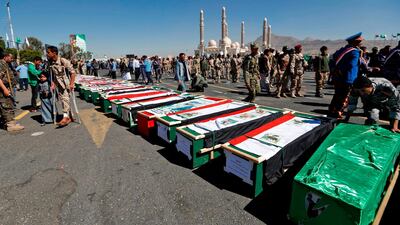Houthi militias lost control of Al Khokha city near the strategic port of Hodeidah in western Yemen after an uprising by the local residents welcomed a battlefield victory by resistance fighters backed by the UAE armed forces.
Yemeni forces supported by the Arab coalition advanced overnight to liberate the coastal area from the grip of the Houthi fighters and immediately the UAE Emirates Red Crescent began to roll out its relief plan in the area, providing assistance to the residents.
The advances in the area raises hopes that the strategic port can be freed from the control of rebel groups and that humanitarian aid can resume free shipments to alleviate the famine conditions in large swathes of Yemen.
Houthi commanders in Sanaa were executing scores of supporters of Ali Abdullah Saleh and had arrested hundreds more after launching a round-up in the capital. The 75-year old former president was killed in Sanaa on Monday by the Iran-backed faction.
"Houthi militia carried out mass executions for the members of the General People's Congress (GPC) party, I am extremely sure of such information, if the Houthis deny this, I challenge them to accept an independent committee to carry out an investigation by honest Yemeni doctors to investigate the crime transparently," said Ali Al Bukhaity, a defector from the Houthi alliance that took control of northern Yemen, ousting the government.
"According to the information I have they executed 37 of the internees who were wounded. They took them out of the hospitals and executed them at once. They are going to bury the corpses in a confidential place to hide their crime."
A member of Saleh's General People's Congress said he had fled the capital to escape arrest but said other activists had not been able to get out and their fate was unknown.
Sanaa resident Muneer Al Adimi said it was unsafe for anyone linked to the GPC to resume their regular life because the Houthis were pursuing party members throughout the city. Some had been killed, others arrested and some had managed to flee.
"The Houthis set up many checkpoints in different streets in Sanaa to chase the GPC members, while Saleh's supporters have disappeared from Sanaa," Mr Adimi said.
Maj Gen Ahmed Ali Abdullah Saleh, the eldest son of the former leader, has vowed to take the reins of the movement and avenge his father's death.
_______________
Read more:
Saleh has lost the battle, but the Houthis may have lost the war
Sheikh Mohammed bin Zayed offers condolences to son of former Yemeni president
________________
When Saleh switched sides against the Houthis he said he was ready to end a nearly three-year-old war if the Saudi-led coalition agreed to stop attacks on the country. That declaration proved to be his death warrant.
But Sanaa residents said Saleh's killing on December 4 had galvanised opposition to the Houthis. At least 25 people from both sides were killed in the fighting before Yemeni fighters captured the town, plus a small fishing port.
Saleh's body remained at a military hospital in Sanaa while the Houthis — who control the capital — and members of his party sparred over burial plans, sources close to the family said.
The sources said the Houthis had demanded that Saleh's body be buried in a family ceremony at his home village of Sanhan, south of Sanaa, while the family was insisting that the Houthis hand over the body without any conditions.
The Houthis said they had found stashes of gold and cash at Saleh's residence, which they had over-run and seized before his death on Monday, and confiscated it for the benefit of the state treasury. The group gave no details on the amount and the report could not independently be verified.
UN-appointed investigators said in 2015 that Saleh was suspected of having corruptly amassed as much as $60 billion, equivalent to Yemen’s annual GDP, during his 33 years in office.
ESCALATING STRIKES
For residents of Sanaa, however, life is a daily struggle against severe shortages of water, fuels and gas. On Thursday, there was also no internet service or social media.
The Saudi-led coalition has stepped up air strikes on Yemen since Saleh's death as Houthi forces have tightened their grip on the capital.
Residents said fighters known as the Southern Resistance, together with other local forces and backed by coalition advisers from the United Arab Emirates, launched attacks on Al Khoukha, 350km from Sanaa.
The Houthi-run Saba news agency reported heavy air strikes on Sanaa and in the Saada province in northern Yemen,
When Saleh switched sides against the Houthis he said he was ready to end a nearly three-year-old war if the Saudi-led coalition agreed to stop attacks on the country.
Reporters Without Borders called for the immediate release of 41 journalists who have been detained by the Houthis from Yemen Today TV channel, a GPC outlet.
"The rule of the Houthis is that if you do not support me, you are my enemy, " said a Sanaa-based journalist. "They do not believe in freedom. No organisation or press associations has been able to help my 41 colleagues, so I think that the Houthis will target all of us and no one will help."
Thousands of Yemenis have fled to areas outside Houthi control or even abroad, since the war began in 2015.

